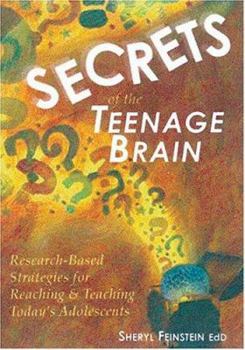Secrets of the Teenage Brain: Research-Based Strategies for Reaching & Teaching Today′s Adolescents
Formerly a publication of The Brain Store
Let′s face it-the weather is more predictable than the average teen. Suddenly, even the brightest and most cooperative students become argumentative and distracted. The good news is there are ways you can navigate these abrupt shifts and still be an effective teacher.
Recent neuroscientific findings have revealed that the teenage brain is actually undergoing developmental...
Format:Paperback
Language:English
ISBN:1890460427
ISBN13:9781890460426
Release Date:February 2004
Publisher:Corwin Publishers
Length:208 Pages
Weight:1.00 lbs.
Dimensions:0.4" x 7.0" x 10.0"
Customer Reviews
4 ratings
Packed with educational paths and ideas
Published by Thriftbooks.com User , 15 years ago
Sheryl G. Feinstein's SECRETS OF THE TEENAGE BRAIN is organized around specific areas of teen development and offers new instructional strategies that can be modified and adapted to various content areas. From the latest facts and research to strategies for issues such as ADHD and aggression, this is packed with educational paths and ideas.
Great book
Published by Thriftbooks.com User , 16 years ago
Dr Feinstein is one of my professors. I have taken two courses from her. I walked away from each course feeling better equipped as I prepare to teach my first class of students.
Excellent Source for Middle & High School Teachers
Published by Thriftbooks.com User , 17 years ago
I am a continuation high school teacher. My students come from situations of illness, abuse, preganacy,trouble with the law and different styles of learning. They are in my classes because they didn't make it in a regular school setting. This book has given me such insight to the brain development of my students. "Secrets," has provided an understanding of the "neurological and biological changes that teenagers experience." The most useful aspect, included in each chapter, of "Secrets" are the sections on "Instructional Strategies," and "Things to Try." I will definitly use these suggestions in my classroom next term. This is a great tool to add to my teacher's bag-of-tricks!
A Fast and Enlightening Read - Excellent for Teachers and Parents
Published by Thriftbooks.com User , 17 years ago
I borrowed this book from the library and read it over the course of three days. I found it very "readable" and with plenty of big words about the brain in which I have only a passing interest. If you are in a rush get this from the library, otherwise wait and buy one or more of her upcoming books titled: "Parenting the Teenage Brain: Understanding a Work in Progress" (due in July 2007, 162 pages), "Learning and the Brain: A Comprehensive Guide for Educators, Parents, and Teachers" (due in August, 2007, 576 pages),and "Teaching the At-Risk Teenage Brain" (due in October 2007, 136 pages), [I believe this may be an update of "Secrets of the Teenage Brain" but am not sure.] The chapters in "Secrets of the Teenage Brain" are: 1 - Teen Brain: Under Construction - talks about how the brain is like the framing of a house that still needs walls, wiring and a roof. 2 - Teen Cognition and Learning - keys to understanding how the teen learns and how teachers and parents can help in the process. 3 - The Social Brain - a great way to see life from your teen's point of view. 4 - Communication and the Unfinished Brain - yes it is possible to have meaningful communication with a teen. 5 - Self-Concept Under Attack - advice on how to improve the teen's (and your own) self view. 6 - The Risk-taking Brain - why they do it and how to help them not make such bad judgments that may have a lifelong impact. 7 - Reaching and Teaching Today's Adolescents - Tomorrow - Make a school that .... And finally she wraps it all up with a four page summary of the entire book. There is a lot of meat in this book for teachers and parents. I plan to purchase all three of her upcoming books as I am a volunteer working with pre K - 14 at risk students but I suggest you star with the one that is most appropriate to your needs. For those interested a description of the upcoming books follows: PARENTING THE TEENAGE BRAIN Teenagers are perplexing, intriguing, and spirited creatures. In an attempt to discover the secrets to their thoughts and actions, parents have tried talking, cajoling, and begging them for answers. The result has usually been just more confusion. But new and exciting light is being shed on these mysterious young adults. What was once thought to be hormones run amuck can now be explained with modern medical technology. MRI and PET scans view the human brain while it is alive and functioning. To no one's surprise, the teenage brain is under heavy construction! These discoveries are helping parents understand the (until now) unexplainable teenager. Neuroscience can help parents adjust to the highs and lows of teenage behavior. Typically, this transformation is a prickly proposition for both teens and their families, but the trials and tribulations of adolescence give teenagers a second chance to develop and create the brain they will take into adulthood. LEARNING AND THE BRAIN Nearly 100 entries describe current brain research as it relates to education, a





